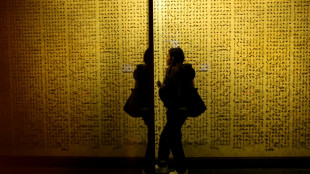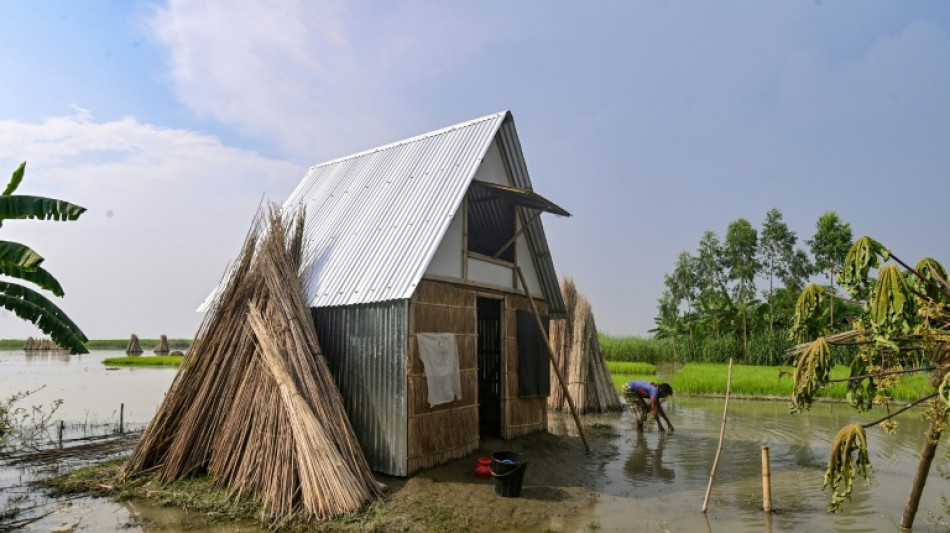
-
 Cash-starved French hospitals ask public to pitch in
Cash-starved French hospitals ask public to pitch in
-
US consumer inflation eases more than expected to lowest since May

-
 Germany's Merz urges US to repair ties with Europe
Germany's Merz urges US to repair ties with Europe
-
Europe seeks new 'partnership' with US at security gathering

-
 Fresh water leak adds to Louvre museum woes
Fresh water leak adds to Louvre museum woes
-
Floods wreak havoc in Morocco farmlands after severe drought
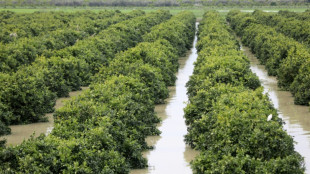
-
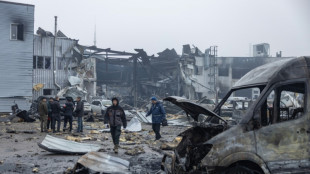 Russia, Ukraine to hold talks in Geneva on February 17-18
Russia, Ukraine to hold talks in Geneva on February 17-18
-
Ukraine's Heraskevych hopes 'truth will prevail' in Olympics appeal

-
 Dumplings and work stress as Chinese rush home for Lunar New Year
Dumplings and work stress as Chinese rush home for Lunar New Year
-
Macron denounces 'antisemitic hydra' as he honours 2006 Jewish murder victim

-
 India-Pakistan: Hottest ticket in cricket sparks T20 World Cup fever
India-Pakistan: Hottest ticket in cricket sparks T20 World Cup fever
-
Cross-country king Klaebo equals Winter Olympics record with eighth gold

-
 Ukraine's Heraskevych appeals to CAS over Olympic ban as Malinin eyes second gold
Ukraine's Heraskevych appeals to CAS over Olympic ban as Malinin eyes second gold
-
Stocks mostly drop after Wall Street slide

-
 Sophie Adenot, the second French woman to fly to space
Sophie Adenot, the second French woman to fly to space
-
Alleged rape victim of Norway princess's son says she took sleeping pills

-
 Activist group Palestine Action wins legal challenge against UK ban
Activist group Palestine Action wins legal challenge against UK ban
-
Driven by Dhoni, Pakistan's X-factor tweaker Tariq targets India

-
 Davidson set to make history as Ireland seek to rebound against Italy
Davidson set to make history as Ireland seek to rebound against Italy
-
Europe defends NATO, US ties at security gathering

-
 China's fireworks heartland faces fizzling Lunar New Year sales
China's fireworks heartland faces fizzling Lunar New Year sales
-
Bangladesh's Yunus 'banker to the poor', pushing democratic reform

-
 Cracknell given Six Nations debut as Wales make changes for France
Cracknell given Six Nations debut as Wales make changes for France
-
L'Oreal shares sink as sales miss forecasts

-
 Bangladesh nationalists celebrate landslide win, Islamists cry foul
Bangladesh nationalists celebrate landslide win, Islamists cry foul
-
Thai PM agrees coalition with Thaksin-backed party

-
 Zimbabwe pull off shock win over Australia at T20 World Cup
Zimbabwe pull off shock win over Australia at T20 World Cup
-
Merz, Macron to address first day of Munich security meet

-
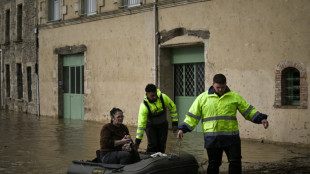 Three dead, many without power after storm lashes France and Spain
Three dead, many without power after storm lashes France and Spain
-
Bennett half-century as Zimbabwe make 169-2 against Australia

-
 Asian stocks track Wall St down as traders rethink tech bets
Asian stocks track Wall St down as traders rethink tech bets
-
'Weak by design' African Union gathers for summit

-
 Nigerian conservative city turns to online matchmaking for love
Nigerian conservative city turns to online matchmaking for love
-
Serb-zero: the 'iceman' seeking solace in extreme cold
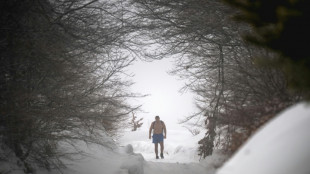
-
 LeBron James nabs another NBA milestone with triple-double in Lakers win
LeBron James nabs another NBA milestone with triple-double in Lakers win
-
Hundreds of thousands without power after storm lashes France
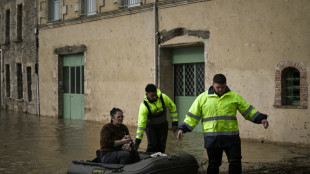
-
 US Congress impasse over migrant crackdown set to trigger partial shutdown
US Congress impasse over migrant crackdown set to trigger partial shutdown
-
AI's bitter rivalry heads to Washington

-
 South Korea hails 'miracle' Choi after teen's landmark Olympic gold
South Korea hails 'miracle' Choi after teen's landmark Olympic gold
-
England seek statement Six Nations win away to Scotland

-
 Trent return can help Arbeloa's Real Madrid move forward
Trent return can help Arbeloa's Real Madrid move forward
-
Battling Bremen braced for Bayern onslaught

-
 Bangladesh nationalists claim big election win, Islamists cry foul
Bangladesh nationalists claim big election win, Islamists cry foul
-
Tourists empty out of Cuba as US fuel blockade bites

-
 Tearful Canadian mother mourns daughter before Carney visits town shaken by killings
Tearful Canadian mother mourns daughter before Carney visits town shaken by killings
-
Italy dream of cricket 'in Rome, Milan and Bologna' after historic win

-
 Oscars museum dives into world of Miyazaki's 'Ponyo'
Oscars museum dives into world of Miyazaki's 'Ponyo'
-
Dieng powers Bucks over NBA champion Thunder

-
 Japan seizes Chinese fishing vessel, arrests captain
Japan seizes Chinese fishing vessel, arrests captain
-
Bangladesh political heir Tarique Rahman poised for PM


Bangladesh's 'tiny houses' tackle giant flood challenge
An award-winning architect in Bangladesh, one of the nations most at risk from flooding driven by climate change, has developed an ingenious two-floor housing solution to help people survive what scientists warn is a growing threat.
This year, when the annual monsoon floodwaters swelled the country's mighty Brahmaputra river, 40-year-old farmer Abu Sayeed did not have to abandon his home for the first time in his life -- but merely climb up a ladder and wait out the waters.
The "Khudi Bari" or "tiny house" -- resilient homes made on bamboo stilts rising out of the floodwaters that are also easy to move to safer locations when needed -- offer hope to millions.
"Khudi Bari has saved us," Sayeed told AFP, who like millions, lives on Bangladesh's vast river floodplains because the fertile soil is good for the maize and chilli crops he grows.
"We did not leave... we slept on the upper floor. I hope we will never have to flee our homes thanks to this house."
Bangladesh is listed as the seventh most vulnerable to extreme weather caused by climate change and rising sea levels, according to the environmental rights organisation Germanwatch.
Much of Bangladesh is made up of deltas as the Himalayan rivers of the Ganges and Brahmaputra slowly wind through the low-lying country towards the sea.
With millions at risk, relocating people to higher ground is a near-impossible task.
"Fleeing your home during the floods is part of your life," said Sayeed, from the northern village of Shildaha, where 17 prototype Khudi Bari houses have been built by Bangladeshi architect Marina Tabassum.
"And often, when the floodwater recedes, you come back to see that your goods were all stolen."
- 'Climate preparedness' -
Scientists warn of the growing impact of climate change -- increasing the intensity of monsoon rains, as well as warning that ice in the Himalayas is melting faster than ever before.
Floods in 2022 in Bangladesh's northeastern Sylhet region were some of the worst on record, leaving millions stranded and around a hundred killed.
The government has built thousands of strongly built shelters for cyclones -- the equivalent of hurricanes in the North Atlantic or typhoons in the Northwest Pacific -- to withstand the severe storms that are also increasing in regularity.
But while reducing fatalities, cyclone shelters are suitable only for hunkering down during the short span of a storm.
However, floods can swamp land for months.
Tabassum therefore worked to design a home for the "lowest cost possible for those in need", using locally available materials by combining bamboo poles and metal sheeting.
Winner of the Aga Khan Award for architecture for her design of the Bait-ur-Rouf Mosque in Dhaka, and designer of the country's Independence Monument, Tabassum developed prototype shelters to test them against flash flooding and storm winds.
"It can be assembled and disassembled very easily," she told AFP, calling it a "climate preparedness" project, with each house costing around $450 to build, including labour.
"It's a mobile modular system, so that's why it can be moved from one location to another," said Tabassum, the winner of Britain's Soane Medal for architecture in 2021, including for her tiny house work.
Most of the Khudi Bari owners use their own solar panels, according to Mohammad Azam Khan whose charity, National Development Programme, joined with Tabassum's organisation to build the homes for farmers.
Arman Abedin, an associate of Tabassum, said every four-metre-high tiny house has two floors, each 100 square feet (9.3 square metres).
He said the architect has also used the Khudi Bari model to build a larger community centre for Rohingya refugee women in the Bangladeshi camps.
- 'All over the country' -
Mohammad Kalu, 35, who lives in one of the Shildaha homes on stilts, said the design meant people could easily adapt.
"If water rises to the chest or even cheek level, still we can stay in this house... we can go to the upper floor and cook with gas or firewood," he said.
"When the current is strong, we untie the tin walls and the water goes through our houses without any obstruction."
Tabassum said she was partly influenced by the traditional wood homes of Bangladesh's central Munshiganj, raised on stilts to allow floodwaters to pass under during monsoon season.
But Sayeed said the design meant the new houses -- with wooden stilts wrapped in metal covers -- were far easier to move than traditional constructions.
"Now we don't need to buy new materials when we disassemble the houses," he said.
Tabassum is busy building more than a hundred Khudi Bari across Bangladesh to offer an example and inspiration for others.
Mohammad Jashim, who sells flat-pack wood homes in Munshiganj, said similar raised wooden home designs were proving popular.
"We are selling these homes all over the country," he said. "They are environmentally friendly, can be easily relocated and can resist floods."
D.Kaufman--AMWN
